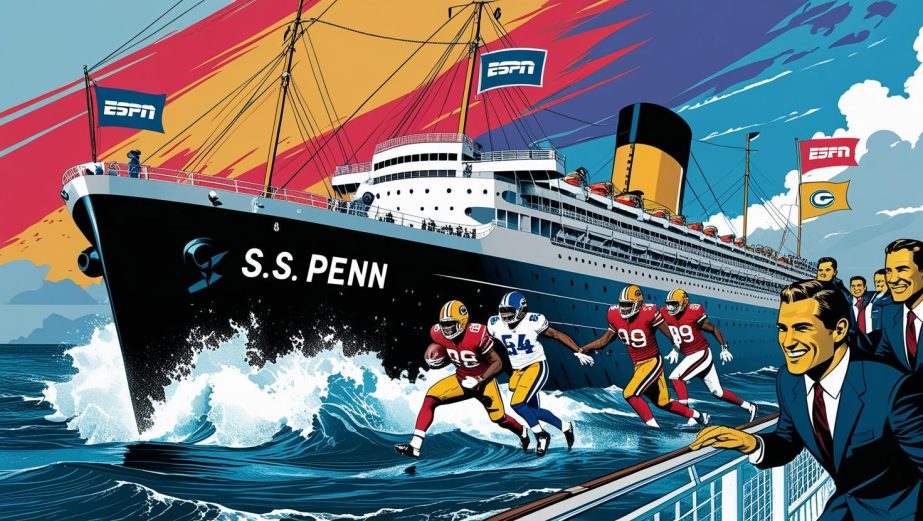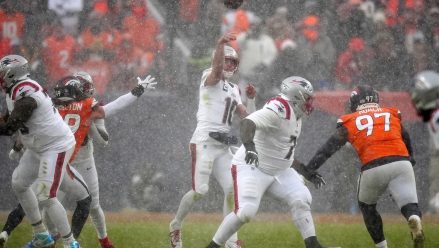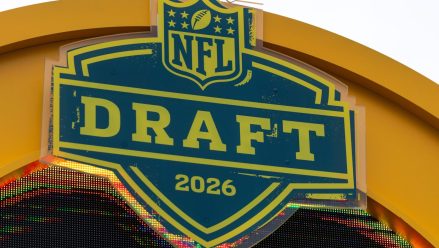Shareholder presentations over the future of ESPN Bet operator Penn Entertainment may not be a near-daily occurrence anymore, but behind the scenes, Penn’s board and activist investor HG Vora are still jockeying over the fate of the company.
The battle between the two became less public after the operator’s annual general meeting in June.
At the meeting, the majority of voting shareholders cast ballots using HG Vora’s proxy card, which called for the election of three candidates to Penn’s board. But Penn – which argues only two seats are available, having shrunk the size of its board earlier this year – sat two members. HG Vora says Penn’s decision to change its board size is unlawful and is fighting to get its third candidate added.
That case is before the U.S. District Court for the District of Pennsylvania.
Penn-motion-to-stayBut two recent events at other operators with HG Vora’s backing may raise questions about whether the investor’s gambling moves have not taken regulatory elements fully into account, and perhaps more broadly about its involvement in the industry.
HG Vora has mostly taken a passive approach to its gaming investments, opting not to encourage bids to make specific changes.
But it appears that when it does seek to influence operations or strategy, it may have struggled with aspects related to the highly regulated nature of the gambling sector.
HG Vora’s Maverick involvement
HG Vora was a major financial backer of Maverick Gaming, which filed for Chapter 11 bankruptcy protection in July. At its peak, Maverick owed HG Vora $365 million before a refinancing.
Maverick Gaming, founded by Eric Persson and Justin Beltram, started out with small casino operations in Nevada, then bought up cardrooms in Washington state as well as some Colorado casinos, usually saying the deals were funded by HG Vora. As of July 2023, it owned 23 Washington cardrooms. In Washington, Class III gaming falls under the purview of the state’s Indian tribes, some of which have full-fledged Las Vegas-style casinos. The card rooms, like the tribes, are regulated by the Washington State Gambling Commission (WSGC), but have low bet limits and limited game offerings.
Maverick ultimately failed.
Recent reports have questioned whether – given its backing of the expanding gambling business – HG Vora may have made “missteps.”
Maverick bankruptcy documents list three events that led to its inability to pay its debts. Alongside the open-ended “Internal and External Business Challenges,” Maverick mentions “Competition and Regulation in Washington” and a “Resulting Decline in Revenue.”
82f14cbd-5510-47a3-bf87-38ab84cde80d-2The section about competition and regulation in Washington mostly notes that the state’s tribes have the ability to offer certain forms of gaming that cardrooms cannot.
“Much of the regulatory impact on the Debtors’ operations in Washington is due to state gaming restrictions on card rooms, e.g., prohibiting slot machines, roulette, craps, and other casino-style gaming, sports betting and the provision of consumer credit, which restrictions are not applicable to tribal casinos,” the filing says.
Maverick’s cardrooms were not able to offer any of these games when the company started buying up casinos. And tribes had been allowed to offer all of those products except sports betting, which was legalized in March 2020 and went live in September 2021, since before Maverick was formed. The filings lead to speculation about why HG Vora would have backed a proposition built upon a regulatory structure that Maverick would later claim was challenging enough to be a factor in its bankruptcy.
Did Maverick need legislative change?
Maverick’s actions in Washington suggest the business proposition may have relied on regulatory or legislative change.
In September 2019, soon after HG Vora got on board and as the business bought up more Washington cardrooms, Maverick set up a political action committee named Washingtonians Win. The committee received $2 million within a year of its founding — big money for a state PAC.
The purpose of the committee was to convince the state to legalize sports betting at commercial cardrooms, as well as online. Online licenses would be tied to retail licensees, meaning major online players would be incentivized to sign market-access deals with cardrooms or tribes.
But the effort was largely a failure as the legislature voted to approve sports betting only at tribal casinos in 2020. Maverick, which was largely funded by HG Vora at this point, said it would spend $20-$30 million to try to change the law.
“Nothing’s off the table. We’ll do everything we can. Litigation, lobbying, TV ads, whatever it takes to get the message out there,” Persson told the Seattle Times at the time.
During the 2020 election cycle, Washingtonians Win funded a campaign against Joe Walsh, a legislator who helped ensure the tribal bill got passed. The campaign was a failure, with Walsh saying the billboards – depicting him laughing – may have actually made him more popular.
In 2021, Maverick and Washingtonians Win tried again. It clearly saw a huge financial opportunity in sports betting, saying it would pay an extra $50 million a year in taxes between state and local levies if it were legalized.
However, its efforts to change the law again failed.
‘Event-driven’ investor
As a private investment firm, HG Vora isn’t required to publicly disclose the details of its holdings or strategies, but the failed cardroom operator’s steps may suggest that the investor saw the Maverick opportunity as a way to cash in on potential regulatory change.
Making investments in the hope of regulatory change is a common strategy for investors that describe themselves as “event-driven,” like HG Vora does. Typically they look for specific catalysts for their investments to produce a big return.
Initially, when Maverick first set out plans to buy casinos in Washington, it sought a loan from the Nevada State Bank.
After Maverick agreed to a deal to buy Nevada Gold Casinos, which mostly operated cardrooms in Washington and was Maverick’s first foray into that state, HG Vora stepped in with an offer to lend the funds, plus another $39 million, presumably under more attractive terms than would have been offered by the Nevada State Bank.
The loan required that “definitive acquisition documentation” be executed for HG Vora to acquire 9.9% of the outstanding equity of Maverick, suggesting the investor would either take a stake in the company or have the option to do so at a later date.
The loan came into effect when the deal closed in June 2019. The extra $39 million was quickly used to buy more cardrooms across Washington, with more acquisitions to follow.
By August, every press release announcing a new acquisition in Washington would mention sports betting.
“We see our cardroom investment and our future expansion plans as a natural benefit for legal and regulated sports wagering in Washington,” Persson said in one release in October 2019.
In another, weeks later, he said: “Importantly our large portfolio of Casinos in Washington makes Maverick uniquely situated from a distribution standpoint should sports wagering become legalized.”
Similar claims about Maverick’s ability to cash in on legal sports betting appeared in almost every other announcement of a cardroom purchase in Washington.
Maverick pursued other regulatory changes
After back-to-back failures with the legislature, Maverick sought to use the courts to bring sports betting and certain table games to its properties. The business attempted to sue the tribes and then the U.S. government, arguing that the state’s tribal gaming compacts are discriminatory. The lawsuit has made its way up the courts system due to a debate over a procedural question – exactly who Maverick is allowed to sue – with the Supreme Court now considering whether to hear the case.
Maverick’s initial complaint, filed in January 2022, noted that the company “has access to the capital needed to offer a wide variety of Class III games in Washington, including roulette, craps, and sports betting, and to finance any additional facilities or purchase any necessary equipment,” suggesting it was confident that its financial backers would be ready to capitalize on any change in what games were permitted at cardrooms.
Maverick-court-complaint“Maverick is unable to take advantage of the commercial opportunities it has identified because Washington criminally prohibits most Class III games if offered by non-tribal entities,” it added.
With neither the legislature nor judiciary allowing it to offer sports betting, Maverick also hoped to lobby its regulator directly for change. Initially, it asked the WSGC to increase wager limits for house-banked games from $300 to $500. The Commission increased the limit to $400.
It then asked for changes to surveillance rules to allow a company that owned multiple properties to combine their surveillance facilities into a single site. It cited the lack of progress on surveillance rules as it closed four casinos just before filing for bankruptcy protection.
An industry source speaking on a condition of anonymity said HG Vora’s involvement with Maverick was a “red flag.”
“Their playbook and influence is evident, pushing a risky strategy with regulatory considerations at the sacrifice of sound, operational infrastructure,” the source said.
The investor has called for Penn to focus on online casino gaming, legal in seven states, and to deemphasize what HG Vora calls a “failure” of a sports betting operation.
Maverick refinancing resulted in costly loans
In 2021, Maverick refinanced its debt by selling some of its properties or land and leasing them back from the buyers. This move allowed it to repay HG Vora on its initial loans and brought other lenders into the fold. The investor still remained a major creditor, though with other lenders involved, HG Vora’s role after the refinancing was reportedly “more limited” than in 2019-21.
At the time of the bankruptcy, documents show HG Vora was owed $68.9 million, making it the largest single creditor.
a54c6d82-7900-4e2c-a50f-b8ee39169447-3The new loans came with a hefty pricetag, carrying interest rates of at least 8.5%, with the potential to go much higher once central banks started raising rates, according to the filings of publicly traded funds that held some of the loans. As global interest rate benchmarks rose in 2022 and 2023, the interest Maverick was required to pay on its 2021 loans topped 13%, those filings show.
According to Next.io, Maverick was “highly leveraged” — having too much debt when compared to the value of its assets — even before the sale and leaseback, which would have only increased leverage ratios. The Next.io report cites an anonymous source that claims the sale-leaseback program “could have been pushed for by HG Vora.”
Penn has said in stock exchange filings that HG Vora’s plans for the ESPN Bet operator could put it in a risky position in terms of its leverage. Disappointed by Penn’s share performance in recent years, the activist investor has called for management to increase returns to shareholders with a stock buyback. In a filing on 15 May, Penn argued that a stock buyback would push its debt ratios to an “unsustainable” level when rent costs are considered.
The industry source said the investor appeared too focused on shorter-term returns. “Competitors in the markets in which Maverick Gaming operated noted the lack of capital reinvestment in their properties,” they said. “Their casinos were generally described as run down and in need of major improvements. This follows a familiar pattern with HG Vora.
“With Penn, they suggested that the company stop investing in its new retail growth projects and put its available cash towards stock buybacks, a move that would have over-leveraged it, benefiting HG Vora specifically.”
Maverick backed Alexander 888 CEO bid
Another recent event raises further questions about the outcomes of HG Vora’s past moves in the gambling industry.
Last month, prosecution authorities in the U.K. charged a group including Kenny Alexander and Lee Feldman for “offences relating to bribery, conspiracy to defraud, fraudulent trading, cheating the public revenue, evasion of income tax,” and acting as a director while bankrupt, as well as perverting the course of justice. Alexander had been CEO of GVC, an online gambling business that was renamed Entain, from 2007-20; Feldman was chair between 2008-19.
“These offences relate to the provision of gambling services in Turkey between 2011 and 2018,” the UK’s Crown Prosecution Service said.
Less remembered may have been that HG Vora was reportedly backing a plan to put Alexander and Feldman in charge of a major global operator — despite already being seen as a “controversial” choice at the time, according to Earnings + More — until a regulator put a stop to the idea.
Alexander, Feldman and ex-GVC director Stephen Morana formed an investment vehicle named FS Gaming and bought up a stake in 888, the owner of UK sportsbook William Hill, which has since been renamed Evoke. Their plan was to convince the 888 board – looking for a new CEO at the time – to make Alexander its new chief executive and Feldman its chair.
At the time, Earnings + More reported that FS Gaming had the support of HG Vora. No other major shareholders’ stances were reported then.
But the attempt failed when the Great Britain Gambling Commission (GBGC) got involved. The country’s regulator pointed to the fact that at this point there was already an investigation into bribery offenses related to Alexander’s time in charge of GVC.
That investigation was already widely known to the public when FS built its stake and when HG Vora reportedly backed the effort.
It had, in fact, been in the news only weeks earlier, as Entain had revealed it was in negotiations with UK prosecutors to pay a settlement related to the case. When disclosing details of the case to investors or media, Entain typically noted it concerned actions of “former management.” Alexander’s surprise exit from GVC came just days before UK tax authorities said they would be looking into the business for the events that eventually led to Alexander being charged.
Media at the time noted that putting Alexander in charge of 888 “would be controversial” given the probe and suggested the timing of his GVC exit implied it was linked in some way to the investigation.
Soon after HG Vora was linked to the plan, the GBGC launched a review into 888 and said it could lose its license if unsuitable candidates were appointed.
“The GBGC has confirmed that a licence review allows for a range of outcomes, including immediate suspension, revocation of operating licences, or the imposition of licence conditions or financial penalties if the Commission finds that licence conditions have been breached, or that the operator, or relevant persons connected to the operator, are unsuitable.” it said.
Instantly, 888 ended talks with FS and said doing so ensures its license would no longer be at risk.
The Guardian reported at the time that it was HG Vora’s support of the FS campaign that triggered the gambling commission to launch the review.
HG Vora wants leadership change at Penn
That failed leadership change may raise new questions amid HG Vora’s criticism of Penn boss Jay Snowden this year.
In a 116-page presentation published in May, HG Vora said “the board should carefully review Mr. Snowden’s performance and track record and consider whether his contract should be renewed.”
HG Vora has argued that the chief executive of Penn should have experience in online gambling, mergers and strategic transformation. HG Vora noted in an investor presentation that Snowden had experience in none of these areas.
However, the results the last time the investor tried to get involved in selecting a gaming CEO may suggest it put too much weight on those qualifications – where Alexander checked all the boxes – when compared with regulatory track record.
Stock trick may limit regulatory scrutiny
State gaming regulators are able to examine the suitability of large shareholders that exert influence on licensees.
However, HG Vora’s exposure to regulatory scrutiny is more limited than might be expected for a company that has an economic interest in Penn of almost 10%.
That’s because the investor only directly holds a 4.8% stake in the ESPN Bet operator while holding another 4.8% in “cash-settled swaps.” These instruments are designed to ensure HG Vora maintains the same economic interest in Penn, profiting from share price rises and taking losses if the price falls, without holding the shares itself.
In a stock exchange filing, HG Vora says it opted for this plan specifically because it had not yet received approval from one regulator – the Massachusetts Gaming Commission (MGC) – in order to try to elect new shareholders at Penn.
At a public meeting of the MGC last December, HG Vora attempted to expedite its approval and argued that appointing board members was a “limited procedural step.” Penn lobbied against expedited approval, arguing that the launch of a proxy fight would lead to major consequences for Penn and its shareholders.
After this meeting, HG Vora set about replacing some of its directly owned shares with swaps. HG Vora notes that its decision to do so followed “discussions” with the state regulator.
If HG Vora were still over the 5% threshold, regulators may be able to review its past record when it has taken a more active role at gambling businesses. But without being a licensee itself with its current stake, ability to take action may be more limited.
Penn hopes for ESPN Bet turnaround
The conflict comes as Penn aims to turn the fortunes of ESPN Bet around.
Despite Penn paying $2 billion to partner with ESPN, the collaboration has struggled for market share so far, holding less than 3% of the overall sports betting market, according to Casino Reports.
Penn and ESPN have a clause in their agreement that would allow either to cancel the partnership if it fails to achieve certain market-share targets by August 2026. The exact target needed is unknown, but current performance is almost certainly well below the threshold. Snowden has alluded to the break clause on earnings calls.
HG Vora has argued that ESPN Bet’s struggles show Penn’s strategy has been misguided.
Penn has own regulatory missteps
HG Vora’s documents to win over shareholders have noted that Penn’s own record seems to include regulatory missteps as well.
It says Penn’s tie-up with the Barstool brand and its “outspoken founder” Dave Portnoy may have “presented challenges for a highly regulated company.”
Barstool, which Penn had paid $551 million to buy, was sold back to Portnoy for $1 in 2023 after having little success gaining market share, and having agreed to the ESPN deal. Later that year, Snowden noted the highly regulated nature of gambling as a reason why the deal between the two ultimately proved unsuccessful.
Regulators in Massachusetts challenged Barstool’s promotion of a so-called “can’t lose parlay,” while Penn was fined in Ohio for promoting the sportsbook during a Barstool show on the University of Toledo campus.
How involved should hedge funds be?
HG Vora’s track record may lend credence to Penn’s claim that the company “appears unfamiliar with the well-established gaming regulatory framework,” despite years of involvement with the sector.
Penn-Vora-ResponseThe performance of Maverick and the failed CEO bid at 888 may raise broader questions about hedge funds exerting influence on gambling companies when regulatory issues are at play.
The events may show the limits of an activist playbook in a highly regulated industry, where event-driven strategies can be checked by regulators or legislative events long before shareholders see any upside.
A representative for HG Vora did not respond to a request for comment when approached by InGame.







